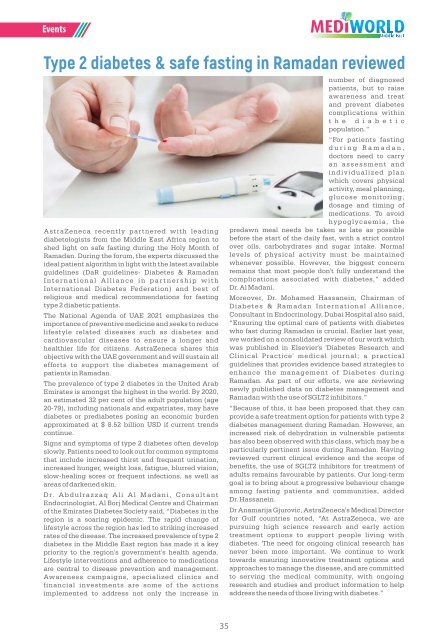Create successful ePaper yourself
Turn your PDF publications into a flip-book with our unique Google optimized e-Paper software.
Events<br />
Type 2 diabetes & safe fasting in Ramadan reviewed<br />
AstraZeneca recently par tnered with leading<br />
diabetologists from the Middle East Africa region to<br />
shed light on safe fasting during the Holy Month of<br />
Ramadan. During the forum, the experts discussed the<br />
ideal patient algorithm in light with the latest available<br />
guidelines (DaR guidelines- Diabetes & Ramadan<br />
I n t e r n a t i o n a l A l l i a n c e i n p a r t n e r s h i p w i t h<br />
International Diabetes Federation) and best of<br />
religious and medical recommendations for fasting<br />
type 2 diabetic patients.<br />
The National Agenda of UAE 2021 emphasizes the<br />
importance of preventive medicine and seeks to reduce<br />
lifestyle related diseases such as diabetes and<br />
cardiovascular diseases to ensure a longer and<br />
healthier life for citizens. AstraZeneca shares this<br />
objective with the UAE government and will sustain all<br />
efforts to support the diabetes management of<br />
patients in Ramadan.<br />
The prevalence of type 2 diabetes in the United Arab<br />
Emirates is amongst the highest in the world. By 2020,<br />
an estimated 32 per cent of the adult population (age<br />
20-79), including nationals and expatriates, may have<br />
diabetes or prediabetes posing an economic burden<br />
approximated at $ 8.52 billion USD if current trends<br />
continue.<br />
Signs and symptoms of type 2 diabetes often develop<br />
slowly. Patients need to look out for common symptoms<br />
that include increased thirst and frequent urination,<br />
increased hunger, weight loss, fatigue, blurred vision,<br />
slow-healing sores or frequent infections, as well as<br />
areas of darkened skin.<br />
Dr. Abdulrazzaq Ali Al Madani, Consultant<br />
Endocrinologist, Al Borj Medical Centre and Chairman<br />
of the Emirates Diabetes Society said, “Diabetes in the<br />
region is a soaring epidemic. The rapid change of<br />
lifestyle across the region has led to striking increased<br />
rates of the disease. The increased prevalence of type 2<br />
diabetes in the Middle East region has made it a key<br />
priority to the region's government's health agenda.<br />
Lifestyle interventions and adherence to medications<br />
are central to disease prevention and management.<br />
Awareness campaigns, specialized clinics and<br />
financial investments are some of the actions<br />
implemented to address not only the increase in<br />
number of diagnosed<br />
patients, but to raise<br />
awareness and treat<br />
and prevent diabetes<br />
complications within<br />
t h e d i a b e t i c<br />
population.”<br />
“For patients fasting<br />
d u r i n g R a m a d a n ,<br />
doctors need to carry<br />
an assessment and<br />
individualized plan<br />
which covers physical<br />
activity, meal planning,<br />
glucose monitoring,<br />
dosage and timing of<br />
medications. To avoid<br />
hypoglycaemia, the<br />
predawn meal needs be taken as late as possible<br />
before the start of the daily fast, with a strict control<br />
over oils, carbohydrates and sugar intake. Normal<br />
levels of physical activity must be maintained<br />
whenever possible. However, the biggest concern<br />
remains that most people don't fully understand the<br />
complications associated with diabetes,” added<br />
Dr. Al Madani.<br />
Moreover, Dr. Mohamed Hassanein, Chairman of<br />
Diabetes & Ramadan Inter national Alliance,<br />
Consultant in Endocrinology, Dubai Hospital also said,<br />
“Ensuring the optimal care of patients with diabetes<br />
who fast during Ramadan is crucial. Earlier last year,<br />
we worked on a consolidated review of our work which<br />
was published in Elsevier's 'Diabetes Research and<br />
Clinical Practice' medical journal; a practical<br />
guidelines that provides evidence based strategies to<br />
enhance the management of Diabetes during<br />
Ramadan. As part of our efforts, we are reviewing<br />
newly published data on diabetes management and<br />
Ramadan with the use of SGLT2 inhibitors.”<br />
“Because of this, it has been proposed that they can<br />
provide a safe treatment option for patients with type 2<br />
diabetes management during Ramadan. However, an<br />
increased risk of dehydration in vulnerable patients<br />
has also been observed with this class, which may be a<br />
particularly pertinent issue during Ramadan. Having<br />
reviewed current clinical evidence and the scope of<br />
benefits, the use of SGLT2 inhibitors for treatment of<br />
adults remains favourable by patients. Our long-term<br />
goal is to bring about a progressive behaviour change<br />
among fasting patients and communities, added<br />
Dr. Hassanein.<br />
Dr Anamarija Gjurovic, AstraZeneca's Medical Director<br />
for Gulf countries noted, “At AstraZeneca, we are<br />
pursuing high science research and early action<br />
treatment options to support people living with<br />
diabetes. The need for ongoing clinical research has<br />
never been more important. We continue to work<br />
towards ensuring innovative treatment options and<br />
approaches to manage the disease, and are committed<br />
to serving the medical community, with ongoing<br />
research and studies and product information to help<br />
address the needs of those living with diabetes.”<br />
35

















